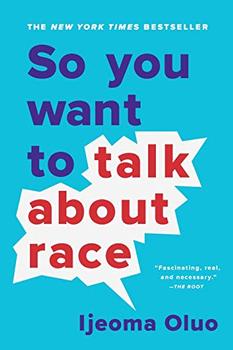Summary | Excerpt | Reading Guide | Reviews | Beyond the Book | Read-Alikes | Genres & Themes | Author Bio

Critics' Opinion:
Readers' Opinion:
First Published:
Jan 2018, 256 pages
Paperback:
Sep 2019, 272 pages
 Book Reviewed by:
Book Reviewed by:
Elisabeth Cook
Buy This Book
This article relates to So You Want to Talk About Race
In So You Want to Talk About Race, Ijeoma Oluo devotes a chapter to racial microaggressions, or everyday instances of racism. As opposed to macroaggressions, which encompass obvious racist behavior such as the use of racial slurs, microaggressions are subtle, sometimes unconscious and often seemingly unremarkable actions that contribute to stereotypes, bias or other types of harm against marginalized groups. Any person who is marginalized on the basis of race, gender, sexuality or other factors may experience microaggressions, but the term is most often applied to words and actions that affect people of color, and this is the context in which it is used in Oluo's book.
The word "microaggression" was first coined in the 1970s by the psychiatrist Dr. Chester M. Pierce, but the concept has since been expanded upon by researchers, notably Dr. Derald Wing Sue. In a 2007 study, Sue proposed three categories to classify racist behavior:
Together, microinsults and microinvalidations make up a combined category of behavior commonly referred to as "microaggressions." Sue suggested that these phenomena can be psychologically draining for people of color, as a person who commits a microaggression often appears unaware of it, and the victim may be left feeling unsure of what has actually occurred. Through focus groups and studies, Sue went on to find evidence that microaggressions can have detrimental effects on those who experience them, and may lead to increased vigilance and feeling the need to control one's behavior in order to avoid further harm.
Microaggressions are already present in the realities of everyday existence for marginalized people, but discussions pertaining to race, such as those Oluo encourages and offers advice for in her book, can create their own hotbed of microaggressive behavior. In particular, when conversations like these lead people to feel that they are being accused of racism, they may become defensive and make microinvalidating remarks along the lines of "I don't see color" or "race doesn't exist for me." For example, if a person of color explains to a white friend that they have been discriminated against by white people in the past, that friend may believe that they have personally been called out for being racist and react by saying, "How do you know that was about race, though? Some of us don't even see color." A remark like this may make the person saying it feel assured that they are not racist, but it serves as a stark reminder to a person of color that they don't get to live in a world where race doesn't exist.
In recent years, microaggressions and the question of how to handle them have become a more prominent topic in discussions of race and racism. Kevin Nadal, a psychology professor who has written several books on the subject, suggests considering the practicality of confronting someone about microaggressions (for example, a person of color might ask themselves if a confrontation is worth the emotional investment) but encourages allies to address a microaggressive act by asking the person who committed it what they meant and giving them a chance to explain or examine their behavior.
Filed under Society and Politics
![]() This article relates to So You Want to Talk About Race.
It first ran in the June 24, 2020
issue of BookBrowse Recommends.
This article relates to So You Want to Talk About Race.
It first ran in the June 24, 2020
issue of BookBrowse Recommends.





The Funeral Cryer by Wenyan Lu
Debut novelist Wenyan Lu brings us this witty yet profound story about one woman's midlife reawakening in contemporary rural China.
Your guide toexceptional books
BookBrowse seeks out and recommends the best in contemporary fiction and nonfiction—books that not only engage and entertain but also deepen our understanding of ourselves and the world around us.